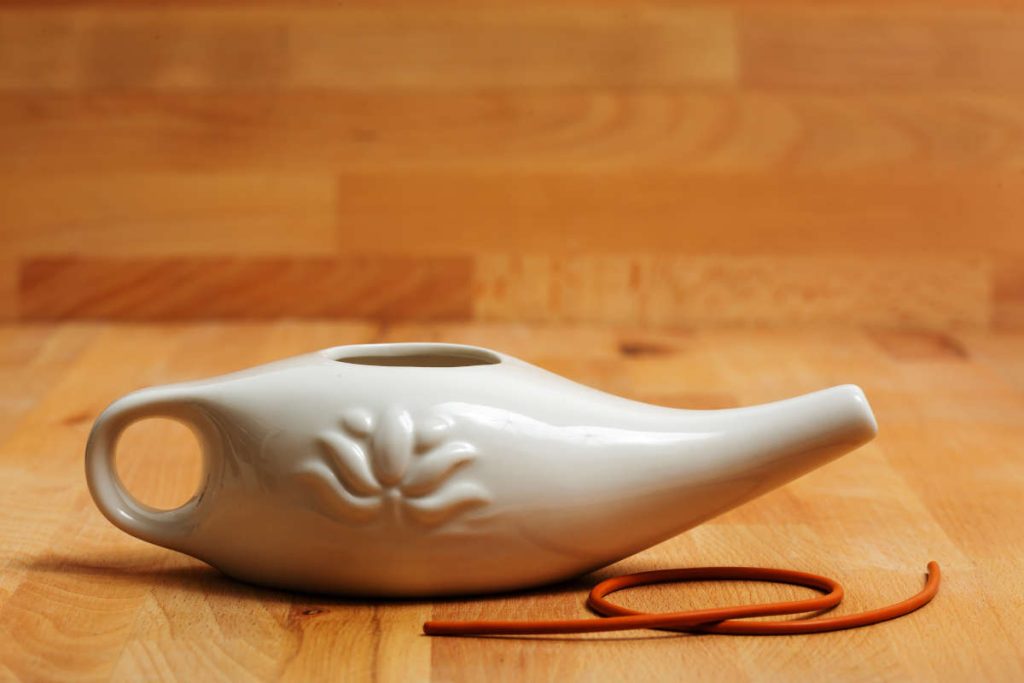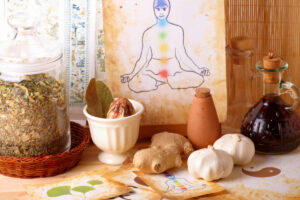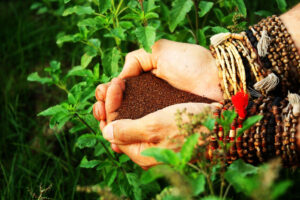Back
Dinacharya: Daily Routines for Morning, Day and Night
04/24/2025 | Written by Radhika Mukhija, Ayurvedic Mentor and Meditation Guide
Live Vibrantly

Dinacharya, or daily routines, is one of the most powerful Ayurvedic tools for improving overall wellbeing. Dinacharya is more than just a set of Ayurvedic rituals for improved health – mind, body and energy. It encompasses routines that guide our movement, meditation, lifestyle rituals and eating habits throughout the day, aligning with our biological clock located in the hypothalamus.
Dinacharya – A Daily Routine
Let’s break down the word Dinacharya –
- Din means day
- Charya literally translates to guidelines and routines.
- By following these guidelines, it brings back balance into our doshas – kapha, vata and pitta.
- It invites us to practice mindfulness and take care of ourselves by aligning to the energies of the day, so we are living in alignment with the rhythm of nature.
This is our natural way of being and Ayurveda is simply reminding us.

Morning
Wake up during Brahma murta
Brahma murta is a sanskrit word that translates to creator’s time. It is the time when our life force energy is considered to be the strongest. It is the best time to practice yoga as it is believed our mind and body are in a state of balance at that hour. It is also for that reason the ideal time for a spiritual practice.
Our mind is connected to the subtle energies of nature.
Wake up at least 1.5 hours before sunrise, practically speaking as long as you wake before sunrise or around is also ok. However, life is challenging sometimes so use this as a guide but ascertain what you need for yourself daily based on what is going on in your life. So if you’re feeling exhausted, unwell and need extra sleep. Listen to your body.
Oil pulling, gandusha in Sanskrit
Oil pulling, or gandusha, is another dinacharya practice of using oil to pull out impurities from your mouth. This is done using coconut or sesame oil, swish your mouth for 10-15 minutes and when done release it in the trash can. Rinse the mouth with water and brush your teeth.
This ritual has many benefits – helps maintain a normal PH balance in the mouth, promotes digestion as it pulls toxins out from the tissues, prevents cavities, and relieves tooth and gum sensitivity so it’s a good practice for your oral microbiome. Additionally it helps pulling bacteria not just from mouth, but from the upper body as well, it moves kapha so you can feel light and energized for the day
Tongue cleaning, or scraping
Gently cleaning your tongue with a copper tongue scraper to remove the toxin buildup from the night before. This simple 10-second practice not only promotes digestion and overall health but also provides insight into your emotional and physical well-being. Examining your tongue can reveal the state of your digestive fire (agni) and indicate how well you’re processing both food and emotions.
Jala neti, or nasal cleansing
Jala Neti, or nasal cleansing, cleanses, soothes and frees the nasal passage – improves overall respiratory health. It’s a vessel that looks like a teapot and allows for gentle nasal irrigation. ¼ tsp of pink salt with 8 ounces of warm filtered water. Pour it into one nostril and release through another. Clean it well after use. Tilt your head slightly forward and tip pot and head towards the side of the nostril. Breathe through your mouth and bring your head back to neutral and repeat on the other side.
Nasya is another ayurvedic ritual for taking care of your nasal passages. If you’re not comfortable with jala neti, you can practice nasya where you lubricate your nasal passages with sesame oil, ghee, or another oil of your choice. This is especially beneficial before practicing Pranayama, as it helps with dry sinuses and allergies, calms the mind, and nourishes the body. Adding three-to-five drops of warm oil to each nostril in the morning can also improve voice, vision, and mental clarity.

Warm water with lemon
Drinking a glass of warm water with freshly squeezed lime or lemon juice and a pinch of pink Himalayan salt each morning is a dinacharya morning practice that helps stimulate digestion, alkalize the body, support adrenal function, and rehydrate the body. The electrolytes from the salt and lemon also aid in rehydration. Sip slowly and mindfully for optimal benefits, including healthy bowel movements.
Other rituals you can add at this time before your morning shower are dry brushing and abhayanga.
Breakfast
In Ayurveda, breakfast is important as it prepares us for lunch, the most important meal. However, it’s okay to skip breakfast if you’re not hungry – listen to your body.
Try some light and nourishing options that are easy on the stomach and provide sustained energy. Some great choices include:
- Stewed fruit with a sprinkle of cinnamon
- A warm bowl of oatmeal with fresh or frozen berries
- A simple egg dish with sliced avocado
- A warm and comforting bowl of soup.
These options are all relatively quick and easy to prepare, and they offer a good balance of nutrients to fuel your body and mind throughout the morning.
If you’re intermittent fasting, pay attention to your energy and focus. If they’re low, you might need to support your blood sugar levels with a meal containing protein and fat as per the suggestions shared.
This is also an ideal time to have a cup of spiced Assam tea. The Organic India Purely Assam Black tea, a black tea with a bold flavor profile, is a popular morning drink choice in India. Often, it is prepared as chai with a combination of warming spices such as ginger, cardamom, cinnamon, cloves, and black pepper.
These spices not only enhance the flavor of the tea but also offer various health benefits. For instance, ginger aids digestion and soothes nausea, while cardamom and cinnamon are known for their antioxidant properties. Avoid cold smoothies or caffeine in the morning before hydrating, as both negatively affect agni (digestive fire). Sit down for all meals, and eat mindfully and chew your food thoroughly to aid nutrient absorption and support your nervous system and digestion.
Transitioning into afternoon
Lunch
Noon-2pm is pitta time and is the best time for the biggest meal of the day, and you should add spices like ginger, turmeric, cinnamon, and cardamom to your meals to support agni.
Take a Walk
Some good dinacharya practices include going for a walk, practicing sama vritti pranayama – equal inhale and exhale and pausing for lunch—the most important meal of the day. It is also beneficial to walk after meals. Studies have shown that after meals – walking is good for heart heart health, lowers blood sugar levels, helps burn fat better, helps with digestion
Mindfulness Practice
When the sun peaks, we experience a shift in our energy, mood, and ability to focus. As a transition period between morning and evening, it’s a good time to start new habits and include rest and mindfulness to recalibrate during the workday.

Transitioning into Evening
Communication
2-6 pm is known as vata time. This is when air and space energy is dominant. This is an excellent time for connection and communication with your friends, loved ones and peers.
Tea Time
There is a tendency to feel tired and drained during this time. This is often due to choices made at lunch. If something was not in alignment with your body and didn’t digest well, it can cause an afternoon slump. To avoid this, be mindful of what you eat for lunch and avoid stimulants. Great time to add in some Moringa Chocolate Latte, or a Tulsi Tea from Organic India USA for an early evening dinacharya practice.

Nighttime
Ratricharya, aka nightly conduct that can help support healthy sleep cycles. Ratricharya aligns with lunar, yin, and sattva energies for evening and bedtime relaxation. Modern lifestyles often disrupt Ratricharya with sympathetic overdrive and technology. Here is a list of practices that can support your Ratricharya:
Night Guidelines
- Turn off tech by 8 pm.
- Use red/amber lights to improve sleep.
- Practice restorative activities like journaling, yoga, and walking.
- Consume soothing drinks before bed. A cup of warm Chamomile Tea from Organic India USA is ideal before bed time.
- Incorporate Triphala into your daily night routine. Triphala, a blend of three Ayurvedic fruits, Amalaki, Bibhitaki, and Haritaki, supports healthy digestion and detoxification. It helps to regulate bowel movements, eliminate toxins, and balance the digestive fire (Agni). It is best taken on an empty stomach before bed.
- Prepare for bed with a face and body rinse, Epsom salt bath, and oil application to the head and feet.
- Be in bed by 10 pm to transition from Kapha to Pitta for detoxification. Not sleeping by 10 pm can disrupt metabolic processes and lead to a second wind.
- Yoga nidra or yogic sleep guided meditation can help aid rejuvenation during sleep.
Nighttime Drinks:
- Chamomile Tea: Before bed, enjoy a cup of warm Chamomile Tea from Organic India USA. Chamomile is known for its calming and relaxing properties, making it an ideal choice to promote restful sleep.
- Warm Milk with Turmeric and Nutmeg: Warm milk with a pinch of turmeric and nutmeg can also aid digestion and promote relaxation. Turmeric has anti-inflammatory properties, while nutmeg can help to soothe the digestive tract.
- Spiced Turmeric Latte from Organic India USA – for a nourishing bedtime drink,This Ayurvedic beverage is made with warm milk, turmeric, ginger, black pepper, and other spices. It is known for its soothing and antioxidant properties and can help to promote relaxation and sleep.

Ayurveda provides a gentle approach to daily routines that aligns with natural rhythms, promoting overall well-being. By incorporating dinacharya, or daily routines, like waking during Brahma murta, oil pulling, tongue cleaning, nasal cleansing, and mindful eating, we can balance our doshas and enhance our physical and mental health.
Transitioning through the day with awareness of energy shifts and establishing consistent sleep and night rituals are vital. Remember, listening to your body and consulting with a healthcare professional or Ayurvedic practitioner is crucial before making significant lifestyle changes. Adopt these ancient practices to live in harmony with nature and yourself.















 Radhika Mukhija is an integrative wellness mentor and meditation guide who empowers busy women to realize their full potential by blending ancient Ayurvedic wisdom with modern science. With over a decade of experience in coaching, Radhika helps clients achieve greater self-care, mental clarity and holistic wellbeing. Radhika is currently writing her debut book, set to be published by Shambhala. Radhika holds a Bachelor’s in Psychology, an MBA in Human Resources, is a certified yoga teacher, and has additional certifications in health coaching, Ayurveda, nutrition, and human potential coaching. Learn more about Radhika at
Radhika Mukhija is an integrative wellness mentor and meditation guide who empowers busy women to realize their full potential by blending ancient Ayurvedic wisdom with modern science. With over a decade of experience in coaching, Radhika helps clients achieve greater self-care, mental clarity and holistic wellbeing. Radhika is currently writing her debut book, set to be published by Shambhala. Radhika holds a Bachelor’s in Psychology, an MBA in Human Resources, is a certified yoga teacher, and has additional certifications in health coaching, Ayurveda, nutrition, and human potential coaching. Learn more about Radhika at